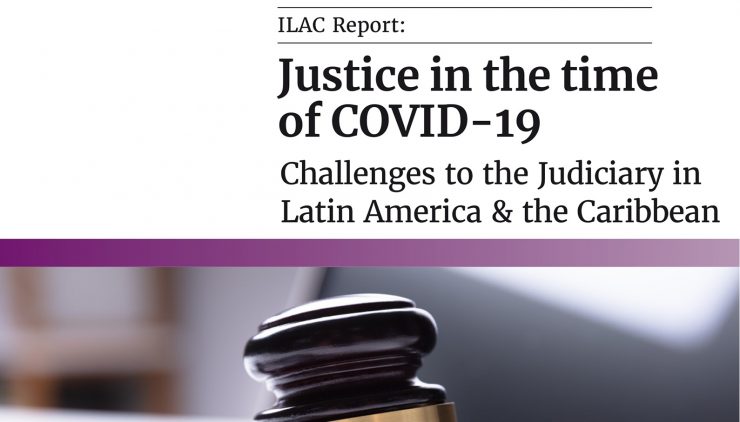This website uses cookies so that we can provide you with the best user experience possible. Cookie information is stored in your browser and performs functions such as recognising you when you return to our website and helping our team to understand which sections of the website you find most interesting and useful.
Justice in the time of COVID-19. Challenges to the Judiciary in Latin America & the Caribbean
December 2020
The Vance Center, together with the International Legal Assistance Consortium, published the report “Justice in the times of COVID-19, Challenges to the Judiciary in Latin America & the Caribbean”.
The judiciary is a key institution for the protection of rule of law and accountable governance. This report, drawing on the experience of judges in Latin America and the Caribbean, describes how measures to manage the pandemic has challenged the judiciary. The challenges and impact are varied and range from putting checks and balances at risk to impairing justice delivery and access to justice.
The declaration of states of emergency and adoption of emergency measures across Latin American and the Caribbean in response to the COVID-19 pandemic have greatly impacted how the judiciary practically functions. This in turn affects individual rights and access to justice. In the past, crises that resulted in states of emergency and emergency measures were usually short lived, and institutions were generally able to return to a state of normalcy relatively quickly. The current crisis is unique in the fact that it is long lasting and has an unknown end date. Some of the implications protracted states of emergency and emergency measures are having on the judiciary, and in turn court users, have already become evident and are discussed in this report.
The pandemic has also immediately affected the judiciary as the executive and legislative branches were handed additional powers to respond to the crisis. In several countries covered in the report, funds and resources have even been reallocated away from the judiciary, impacting the effectiveness of the judiciary’s ability to deliver justice and even putting judicial independence into question. Due process and fair trial standards have been impacted by the inability to hold trials in person and the use of digital justice tools, which raise additional cybersecurity questions. Access to justice and the resolution of everyday justice problems have slowed and backlogs are building in instances where urgent matters, such as criminal and family matters, are being prioritised. Moreover, the digital gap threatens access to justice, and even brought it to a standstill, in some countries. Yet, there are also examples from the region where the judiciary had or was provided with adequate resources and was able to quickly move to using digital justice tools and become even more effective during the pandemic.
Mapping the new challenges and problems presented by the pandemic and subsequent emergency measures, the report identifies best practices, trends and gaps in how governments and the judiciary itself have responded to the crisis. The report provides recommendations as to how governments can respond in the short and long term to ensure that the judiciary can continue guaranteeing access to justice, while also protecting judicial independence, during a protracted crisis like the COVID-19 pandemic.
Key recommendations
- Conduct assessments and reviews to develop plans regarding the allocation of funds and resources in order to ensure that the judiciary can guarantee access to justice on all matters, not just those deemed urgent, and to resolve backlogs built by a slowdown in the delivery of justice in the beginning of the crisis. This should also include reviewing whether courts in capitals and at the national level versus those in provinces and at the regional level have been impacted differently and, if so, in what ways.
- Expand and improve digital justice tools and minimise the digital gap so that due process and fair trial rights are satisfied and access to justice on all matters is guaranteed.
- Establish clear guidelines on cybersecurity, conducting judicial proceedings virtually and ensuring access to public hearings. Such guidelines must be in line with human rights law and rule of law principles to protect guaranteed individual rights, judicial independence and the legitimacy of the judicial proceedings.
Read the report here.
See the report in Spanish here


